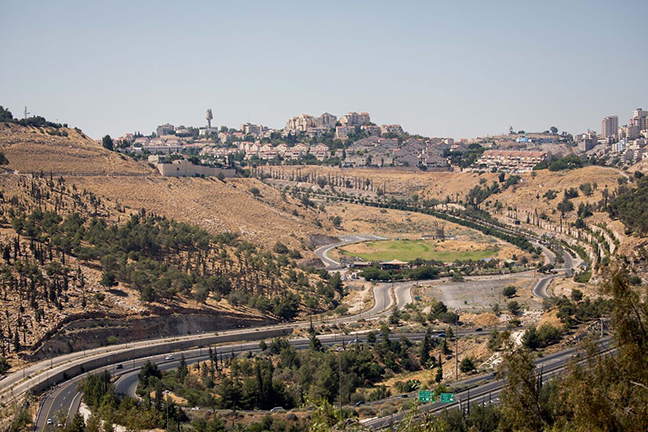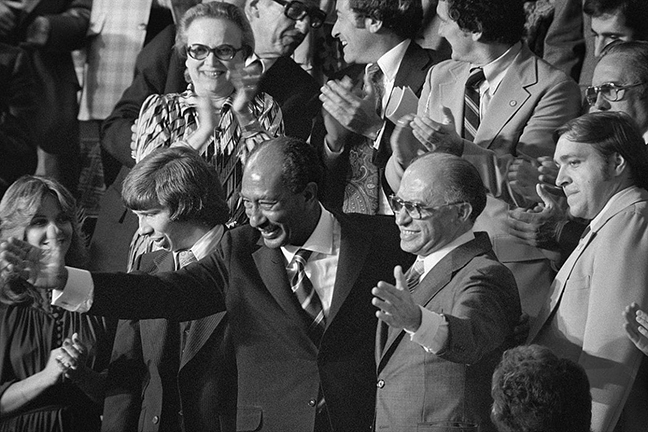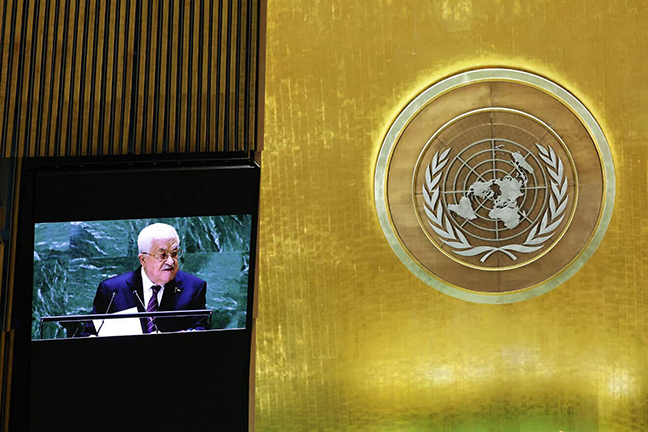Ambassador Friedman unveils Israel-Palestinian peace plan at NRB

Ambassador David Friedman unveils his peace plan for Israel and the Palestinians at the National Religious Broadcasters convention on Feb. 22.
by Larry Brook
(Israel InSight) — With support in Israel for a two-state solution cratering, and a one-state solution a non-starter, former U.S. Ambassador to Israel David Friedman unveiled the Friedman Plan for peace on Feb. 22 at the National Religious Broadcasters convention in Nashville.
Friedman unveiled the Friedman Center for Peace Through Strength’s plan during a session introducing Keep God’s Land, a coalition of Christians and Jews “dedicated to strengthening and defending Israel’s right to its biblical homeland, with the ultimate goal of sovereignty over Judea and Samaria.”
The day before, the NRB announced a “Biblical Heartland Resolution,” urging members to use the names Judea and Samaria in reporting about the area, instead of “the erroneous term ‘West Bank’.”
This came one day after the NRB board passed a resolution pledging “its continued support and friendship with Israeli in her time of need,” condemning terrorism and calling on the hostages to be released, and noting the important role Christian media play in educating about antisemitism.
The NRB convention is a large annual gathering of evangelical media outlets and personalities, and this year’s conference, held in Nashville from Feb. 20 to 23, had a strong emphasis on Israel. Friedman, who served as U>S. ambassador to Israel under President Donald Trump from 2017 to 2021, participated in several events during the conference, and Trump called Friedman to the stage to give remarks during Trump’s address to NRB on Feb. 22.
Friedman said had Trump been in office last year, Hamas would never have been able to invade Israel, because Trump had cut off funds to Hamas and hamstrung Iran, both of which were reversed by the Biden administration. “We’re feeling the pain now because of that,” he told Trump.
Friedman said his plan deals with security, being Biblically correct regarding God’s promise of the land to the Jewish people, and civil rights for all. He said it “recognizes that every human being is created in the image of God.”
When it comes to the Palestinian issue, he said doing nothing is not tenable, especially with how the world is turning against Israel. The two-state solution is non-realistic and it is time to “give up all the fantasies.”
The two-state solution, currently being pushed by the United States and many other countries, has been “the mother’s milk of the Democratic party, and to an extent, the Republicans.” After Oct. 7 “there can’t be a two-state solution,” especially given that polls show 85 percent of Palestinians approved of the Oct. 7 attacks.
Until a few months ago, Israelis were 50-50 on a two-state solution. “Not any more,” he said, noting that the previous day, all members of the Knesset, from far right to far left, who are not in Arab parties, voted to reject any unilateral declaration of Palestinian statehood. The vote was 99-11, with the 11 Arab party members voting against and the Labor Party boycotting the vote.
Friedman said his plan is a “generational plan” and is not going to happen in just a year or two.
The plan starts with an ultimatum to terrorists. “Those of you who want to kill us, we’re going to kill you first. We’re not going to give in to terrorism.” But, “those who want to live with us, live with us.” In the Bible, he said, there were plenty of groups who peacefully lived in the area under Jewish sovereignty.
The plan would then be led by Israel, the United States and the Abraham Accords countries, with Israel retaining sovereignty in Judea and Samaria. There would be a Marshall Plan to build up Palestinian areas, funded by Gulf states, and the Palestinians would have “maximum civil autonomy,” with Israel retaining control of security.
The Palestinians would have permanent resident status and Israeli documents. The only restriction would be that while they could vote in local elections, they could not vote in national elections, because that would give them a way to change Israel from being a Jewish state.
“There are 30 Muslim states. If you want to live in one, pick one. There’s only one Jewish state,” Friedman said. This will give the Palestinians full civil rights, “other than the right to destroy the world’s only Jewish state through demographic power.”
For those who would consider the plan to be apartheid, Friedman asks “is America an apartheid state?” After all, residents of territories like American Samoa, Guam, Puerto Rico and the U.S. Virgin Islands can not vote in national elections, and have just non-voting representation in Congress. “These arrangements are accepted because there are significant reciprocal benefits,” he explained, and “Israel has to help the Palestinians get out from the depths.”
There would be no change in status for Israeli Arabs, they would retain their national voting rights.
While there will be objections, Friedman said “let’s not let the perfect get in the way of the possible.” He anticipates Palestinian opposition, but without a clear successor to the aging and widely unpopular Palestinian Authority Chairman Mahmoud Abbas, and in the aftermath of the war against Hamas, “Israel will have to increase security” to deal with the “vacuum.”
Initiatives to build real lives for Palestinians, rather than recycling the refugee camps and a grievance mentality, “will improve stability” as they come on line, and there needs to be promotion and empowerment of Palestinian leaders who can give the Palestinian people the opportunity for a better future, free of conflict.
The plan “addresses needs on the ground, including the need to improve the Palestinian quality of life,” Friedman said, and it builds upon the Abraham Accords.
With Israel retaining sovereignty in Judea and Samaria, it also ensures that the holy sites of all faiths remain open and are protected.
The message to the Palestinians would be “you’re going to live here forever… we can prosper together.”



